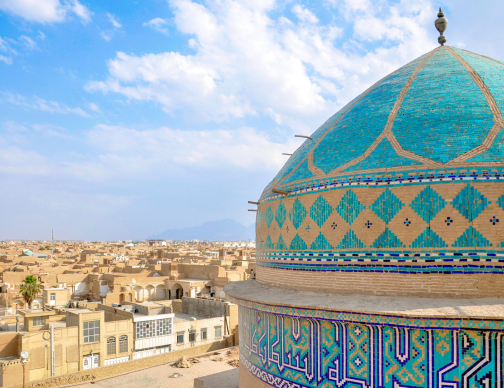Run your business seamlessly with Neeyamo as we help you go beyond borders to manage your international payroll and hire new talent in Iran.
Overview
The art of 'taroof' is an etiquette practice in Iran, where the main goal is extreme politeness. Citizens of the country are required to be polite to others no matter what their social standing is. Taroof pushes citizens to deny things offered to them out of respect until the person offering it compels them to take it. The people of Iran are not only incredibly polite but also have immense talent and potential.
Do your organization's expansion plans require you to hire employees in Iran? Do you lack a physical entity in the country – a key requisite to hiring local talent? Neeyamo assists organizations worldwide with onboarding and managing employees in Iran, along with processing a firm's payroll, compliance, benefits, and more.
Tools And Instances
Facts And Stats
Capital
Tehran
Currency
Iranian Rial
Official Language
Persian (Farsi), Kurdish, Gilaki
Fiscal Year
21 March - 20 March
Date Format
YYYY/MM/DD
Country Calling Code
+98
Time Zone
GMT +03:30
Global Payroll
Overview
Handling payroll for a widespread workforce can pose a major challenge for any firm. The added complication of compliance can make things worse and drastically affect the time and efforts that can be used in other equally important aspects of an organization's development.
Over the years, Neeyamo has observed these complexities and strived to provide a global payroll solution through a single technology platform, Neeyamo Payroll.
Payroll Taxes
Payroll tax is the percentage amount retained from an employee's salary and paid to the government to invest in the welfare of the general population.
Employee Taxes
Income Tax Rate
|
Tax Rate (%) |
From salary amount |
Up to salary |
Floor |
|
Exempt |
1 |
1,440,000,000 |
1 |
|
10 |
1,440,000,001 |
1,980,000,000 |
2 |
|
15 |
1,980,000,001 |
3,240,000,000 |
3 |
|
20 |
3,240,000,001 |
4,800,000,000 |
4 |
|
30 |
4,800,000,001 |
To the top |
5 |
Monthly payroll contributions made in 2024
Social Insurance System:
Employee - 7%
Employer Taxes
Income Tax Rate
|
Tax Rate (%) |
From salary amount |
Up to salary |
Floor |
|
Exempt |
1 |
1,440,000,000 |
1 |
|
10 |
1,440,000,001 |
1,980,000,000 |
2 |
|
15 |
1,980,000,001 |
3,240,000,000 |
3 |
|
20 |
3,240,000,001 |
4,800,000,000 |
4 |
|
30 |
4,800,000,001 |
To the top |
5 |
Monthly payroll contributions made in 2024
Social Insurance System:
Employer - 23%
Other contributions:
- Daily annuity base: 70,000 rials
- Monthly Haghe Maskan(Housing allowance): 9,000,000 Rials
- Bon Kargari monthly: 14,000,000 rials
- Monthly marriage allowance(Fee): 5,000,000 rials
- Monthly child support for each child:
- One child: 7,166,184 Iranian rials
- Two children: 14,332,368 Iranian rials
Payroll Cycle
Overview
Undoubtedly, payroll is a critical process for any organization. Pay cycle refers to the period for which an organization pays its employees, and this can vary depending on the pay frequency that the organization chooses to adopt.
Frequency
As per the Iran Islamic Republic of Iran Labour Code wages are paid monthly by contract, custom, or workplace practice, payment shall take place at the end of each month.
13th Month Cycle
Iran (Islamic Republic of) (168) Act provides that employers must pay their workers the equivalent of two months' wages as a New Year gift and annual bonus if they have completed one year. There is no statutory requirement to pay the 13th or 14th month salary in Iran.
Global Work
Overview
An Employer of Record service provider helps you get rid of the hassle of handling the complexities that come with setting up a new employee in remote locations. They act as legal employers, facilitate salary payments, and handle everything from health insurance. Payroll taxes, and employee benefits to comply with local tax laws and regulations.
This ensures that the client company can focus on the employee’s everyday tasks safely in the knowledge that they have a cost-effective solution as they continue their global expansion.
HR Mandates and Practices
Minimum Wage
In 1403, (i.e. 2024 as per the Gregorian calendar)
The minimum daily salary is 2,388,728 rials.
Overtime
Working Hours in Iran
The workweek in Iran is based on a 44-hour week. Typically, employees work from Saturday to Wednesday (8 hours per day) and half a day on Thursday (4 hours).
Overtime in Iran
The law mandates a payment of 40% above the hourly wage to employees for any accrued overtime. The employee must consent to overtime work.
Data Retention Policy
Employers will only retain employees' personal information for as long as necessary to fulfill the purpose that they collected it for, including for the purpose of satisfying any legal, accounting, or reporting requirements.
Financial Data Retention: The Iranian Association is legally obliged to keep client files in accordance with the terms and conditions of the contracts and grants for a period of time after the last intervention/contact and financial records for a period of seven tax years after the end of the contract with employee, partners and funding body. After the last day of each tax year, the Iranian Association deletes all data that relates to contracts that ended more than seven years beforehand.
Hiring and Onboarding Requirements
Hiring
People who served in the Iranian armed forces during war and their family members are given preferential treatment in terms of administrative and employment opportunities by all publicly funded bodies, including ministries and executive bodies, the armed forces, public companies and institutions, and public, non-governmental institutions. Article 21 of the Law on the Provision of Services to Martyrs 2013 requires all publicly funded bodies to allocate at least 25% of their employment needs to the families of martyrs, veterans, and freed prisoners of war.
In addition to veterans and the families of martyrs, Article 15 of the Family and Youth Protection Law 2021 provides special employment facilities at public entities for married people with children. Private entities are not subject to the hiring preference obligations required of public entities.
The elimination of discrimination and the promotion of equality in employment and occupation is recognized and emphasized under various Iranian laws. For instance, articles 5 and 9 of the Policies on Women's Employment in the Islamic Republic of Iran, approved by the Supreme Council of the Cultural Revolution in 1992, emphasize the necessity of non-discrimination between men and women concerning the conditions of access to employment, wages, and benefits.
Onboarding
Following are required during onboarding:
-
Candidate personal information (only necessary information)
-
National Id
-
Copy of qualifications and references, and resumes
-
Copy of Passport
-
Clearance letter from Interpol or home country
-
Work permit
Probation
Employment contracts may include a probationary period that must not exceed one month for unskilled and semi-skilled employees and three months for skilled and professional employees. During probation, either party may terminate the agreement without prior notice. If the employer terminates the agreement during the probationary period, the salary for the entire probationary period must be paid to the employee. However, if the employee terminates the agreement during the probationary period, the employer is only responsible for paying a salary for the term of actual employment under Article 11 of the Labour Code.
Leave
Public Holidays
The following public holidays are observed in Iran:
- March 20 - Oil Nationalization
- March 21 - Norooz (Persian New Year)
- March 22 - Norooz Holiday
- March 23 - Norooz Holiday
- March 24 - Norooz Holiday
- April 1 - Islamic Republic Day
- April 2 - Nature Day
- April 12 - Martyrdom of Imam Ali
- April 22 - Eid-e-Fetr (End of Ramadan)
- April 23 - Eid-e-Fetr (Additional Holiday)
- May 15 - Martyrdom of Imam Sadeq
- June 4 - Demise of Imam Khomeini
- June 5 - Khordad National Uprising
- June 29 - Eid-e-Ghorban (Feast of Sacrifice)
- July 7 - Eid-e-Ghadir
- July 27 - Tassoua
- July 28 - Ashura September 6 - Arbaeen
- September 14 - Demise of Prophet Muhammad and Martyrdom of Imam Hassan (Tentative Date)
- September 15 - Martyrdom of Imam Reza (Tentative Date)
- September 24 - Martyrdom of Imam Hasan al-Askari (Tentative Date)
- October 3 - Birthday of Prophet Muhammad and Imam Sadeq (Tentative Date)
- February 4th, Saturday - Birthday of Imam Ali and Father's Day (Tentative Date)
- February 11 - Revolution Day
- February 18 - Prophet's Ascension
- March 8 - Imam Mahdi's birthday (Tentative Date)
- December 17 - Martyrdom of Hazrat Fatima (Tentative Date)
Annual Leave
A worker's annual paid leave entitlement shall be one month, including four Fridays. Other holidays shall not be considered part of such leave.
Sick Leave
The period of sick leave shall be considered a part of the service record and retirement of workers with the approval of the Social Security Organization.
Maternity Leave
Women employees are entitled to 90 days of maternity leave. The employee's salary during maternity leave will be paid according to the provisions of the Social Security Act.
Paternity Leave
There is no paternity leave.
Special Leave
Each worker shall be entitled to three days of paid leave in the event of:
- marriage;
- the death of his spouse, father, mother, or one of his children.
Pilgrimage Leave
Every worker shall be entitled to take one full month of paid leave or one month of unpaid leave once during his working life to perform the pilgrimage to Mecca.
Termination
Termination
Grounds for termination
Under article 27 of the Labour Code 1990, as amended (the Labour Code), the employer is allowed to dismiss an employee for valid reasons, such as when the employee fails to perform their duties or violates the disciplinary regulations of the workplace after having been given a written warning. Before such a dismissal, the employer requires the approval of the workplace's Islamic labor council. If the Islamic Labor Council agrees, the employer can terminate the employment relationship upon paying the employee's arrears.
Notice Period
Severance Pay
In the event of termination of the agreement, completion of definite works, or expiry of definite agreements, the employer shall be required to pay a worker who has worked on the job for one year or more than it under an agreement an amount equivalent to one-month salary for each year of continuous or alternate service at the rate of the last salary as severance benefits.
Visa
Overview
Non-Iranians (collectively Expatriates and, individually, Expatriate) cannot (lawfully) work in Iran unless they obtain a work permit and work visa, save for the following exceptions:
- individuals traveling to Iran under diplomatic relations
- approved journalists working for foreign news agencies; and
- persons working for the United Nations or organizations associated with the United Nations.
To obtain a work permit, the Expatriate's proposed Iranian employer will be required to show that:
- there is a lack of relevant expertise for the particular role among Iranian nationals;
- the Expatriate is suitably qualified to fulfill their role; and
- the Expatriates will eventually use their expertise to train an Iranian national to assume their role.
These conditions are applied strictly, reflecting the Iranian government's desire to reduce unemployment rates among Iranian nationals.
If an employer in Iran employs an Expatriate without obtaining the requisite approvals, fines and/or imprisonment of 91 to 180 days can be imposed on a representative of the employer and/or the Expatriate.
Employee Background Checks
Legal and Background Checks
Under Iranian law, there is no express restriction or prohibition against background checks on applicants by employers.
Medical examinations
Under Iranian labor law, there are no express restrictions or prohibitions against requiring a medical examination as a condition of employment. However, an employer may (and, in some circumstances, is obliged to) arrange medical tests for applicants before they commence employment. As Article 90 of the Social Security Law 1975 stipulates that persons employed at workplaces must have the competence and physical capacity compatible with the work to be performed. In some instances, employers are obliged to arrange for the medical examination of applicants before employing them. If, after employment, it is found that the employee did not have the competence and capability to complete the work or the employer delayed the employee’s medical examination and, as a result, the insured employee suffered an accident or deterioration in health, the Social Security Organisation will cover the employee’s medical expenses and demand the associated costs from the employer.
Islamic Republic of Iran. Labour Code- Sec. 81. The medical examination of a young worker shall be repeated at least once a year, and the relevant documents shall be recorded in his service file.
Islamic Republic of Iran. Labour Code- Sec. 81. The medical examination of a young worker shall be repeated at least once a year, and the relevant documents shall be recorded in his service file.
Drug and alcohol testing
While there is no reference in the relevant legislation to alcohol testing of applicants, employers may request that applicants present certification verifying the absence of a drug addiction under Article 23 of the Bill on Strengthening the Punishment of Drug Offenders for Treatment and Employment of Drug Addicts 1980.
Last updated on June 06, 2024
If you have any queries or suggestions, reach out to us at irene.jones@neeyamo.com
Have Queries? Get In Touch With Us
Get in touch with one of our experts and take a quick demo of our services









